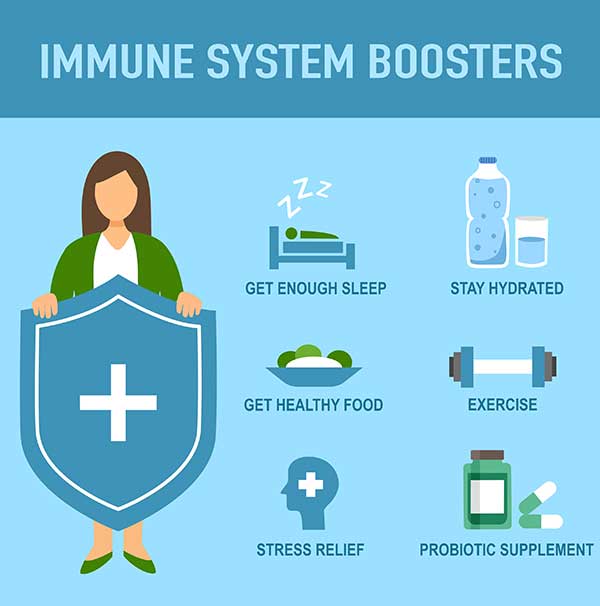
Your immune system is your body’s natural defense force, a complex network of cells, tissues, and organs working tirelessly to protect you from harmful invaders like bacteria, viruses, fungi, and parasites. When functioning optimally, this intricate system identifies and neutralizes threats, preventing illness and keeping you healthy.
In today’s world, with increasing exposure to environmental toxins, stress, and a constant barrage of pathogens, maintaining a robust immune system is more critical than ever. While there’s no magic bullet for guaranteed immunity, empowering your body’s natural defenses is entirely within your control.
Here our experts will delve deep into the world of immunity, providing you with evidence-based strategies and practical tips to fortify your body’s fortress and live a healthier, more resilient life.
Understanding Your Immune System: A Two-Pronged Defense
Your immune system is a marvel of biological engineering, employing a two-tiered defense system to safeguard your health.
Innate Immunity
This is your body’s rapid response team, the first line of defense against invaders. It’s a non-specific system, meaning it reacts similarly to all threats. Think of it as your body’s border patrol, with physical barriers like your skin and mucous membranes preventing entry, and internal defenses like inflammation and fever working to neutralize any trespassers.
Adaptive Immunity
This is your body’s specialized force, a highly targeted system that learns and remembers specific pathogens. When encountering a new threat, this system takes a little longer to respond, but it creates a memory of the invader, allowing for a faster and more effective response upon subsequent encounters. This is the principle behind vaccines, which introduce a weakened or inactive form of a pathogen to “train” your adaptive immune system.
Lifestyle Factors: The Foundation of Strong Immunity
While genetics play a role in immune function, lifestyle factors have a profound impact on your body’s ability to fight off infection. Here are the key pillars of a strong immune system.
1. Nourishing Your Body with a Balanced Diet
Food is your body’s fuel, and providing it with the right nutrients is crucial for optimal immune function. Focus on a diverse, whole-foods diet rich in the following.
Fruits and Vegetables: These are packed with vitamins, minerals, and antioxidants that support immune cell function and protect against cellular damage. Aim for a rainbow of colors to get a variety of nutrients.
Vitamin C: Found in citrus fruits, berries, and leafy greens, this potent antioxidant supports various immune functions, including white blood cell production.
Vitamin D: Crucial for immune regulation, this vitamin is synthesized by your body through sun exposure. You can also find it in fatty fish, eggs, and fortified foods.
Zinc: This mineral plays a vital role in immune cell development and function. Good sources include shellfish, red meat, legumes, and nuts.
Whole Grains: Opt for whole grains over refined grains for their fiber content and immune-boosting nutrients.
Lean Protein: Protein provides the building blocks for immune cells and antibodies. Choose lean sources like poultry, fish, beans, and lentils.
Healthy Fats: Omega-3 fatty acids found in fatty fish, flaxseeds, and walnuts have anti-inflammatory properties and support immune function.

2. Prioritizing Quality Sleep
Sleep is essential for immune system repair and regeneration. During sleep, your body produces cytokines, proteins that play a crucial role in fighting infection and inflammation. Aim for 7-9 hours of quality sleep each night to support optimal immune function.
3. Managing Stress Effectively
Chronic stress can wreak havoc on your immune system, suppressing its ability to fight off infection. Incorporate stress management techniques into your daily routine, such as –
Mindfulness and Meditation: These practices help calm the mind and reduce stress hormones.
Exercise: Regular physical activity has numerous benefits, including stress reduction and improved immune function.
Yoga and Deep Breathing: These techniques promote relaxation and reduce stress levels.
Spending Time in Nature: Connecting with nature has been shown to reduce stress and boost mood.
4. Staying Active and Exercising Regularly
Regular exercise is a cornerstone of good health, including a strong immune system. Physical activity improves circulation, allowing immune cells to travel efficiently throughout the body. Aim for at least 30 minutes of moderate-intensity exercise most days of the week.
5. Maintaining a Healthy Weight
Obesity can impair immune function and increase your risk of infections. Maintaining a healthy weight through a balanced diet and regular exercise is crucial for supporting your immune system.
6. Hydrating Your Body
Water is essential for all bodily functions, including immune health. Staying hydrated helps flush out toxins and ensures efficient transport of nutrients and immune cells throughout the body. Aim to drink plenty of water throughout the day.
7. Avoiding Smoking and Excessive Alcohol Consumption
Smoking and excessive alcohol intake can weaken your immune system and increase your susceptibility to infections. Quitting smoking and moderating alcohol consumption are essential for supporting your body’s defenses.
8. Practicing Good Hygiene
Simple hygiene practices can significantly reduce your risk of infection. Wash your hands frequently with soap and water, especially after using the bathroom, before eating, and after being in public places. Cover your mouth and nose when coughing or sneezing, and avoid close contact with sick individuals.
9. Getting Vaccinated
Vaccines are a powerful tool for preventing infectious diseases. They work by introducing a weakened or inactive form of a pathogen to your body, triggering your adaptive immune system to create a memory of the invader and prepare for future encounters. Stay up-to-date on recommended vaccinations to protect yourself and your community.
10. Considering Supplements Wisely
While a balanced diet is the best way to get the nutrients your immune system needs, certain supplements may offer additional support. Consult with a healthcare professional to determine if supplements are right for you and to choose appropriate options.
Vitamin D: If you have limited sun exposure or are deficient in vitamin D, supplementation may be beneficial.
Zinc: Zinc supplements may be helpful for individuals with low zinc levels or during times of increased immune stress.
Probiotics: These beneficial bacteria can support gut health, which is intricately linked to immune function.
11. Cultivating Social Connections
Strong social connections and a sense of community have been linked to improved immune function. Nurture your relationships with friends and family, engage in social activities, and consider joining community groups to foster a sense of belonging.
12. Laughter and Positive Emotions
Laughter is truly good medicine! It reduces stress hormones and increases the production of antibodies and immune cells. Cultivate joy, laughter, and positive emotions in your life to support your immune system and overall well-being.
13. Minimizing Exposure to Environmental Toxins
Environmental toxins can weaken your immune system and increase your risk of illness. Reduce your exposure by –
Choosing natural cleaning products: Opt for non-toxic cleaning solutions and avoid harsh chemicals.
Filtering your water: Install a water filter to remove impurities and contaminants.
Eating organic produce: Choose organic fruits and vegetables whenever possible to reduce pesticide exposure.
Avoiding air pollution: Limit your exposure to air pollution by staying indoors on high-pollution days and using air purifiers.
Boosting Your Immune System: A Lifelong Journey
Building a robust immune system is not a one-time event but a lifelong journey. By incorporating these strategies into your daily routine, you can empower your body’s natural defenses and live a healthier, more resilient life. Remember, a strong immune system is your best defense against illness and a cornerstone of overall well-being.






